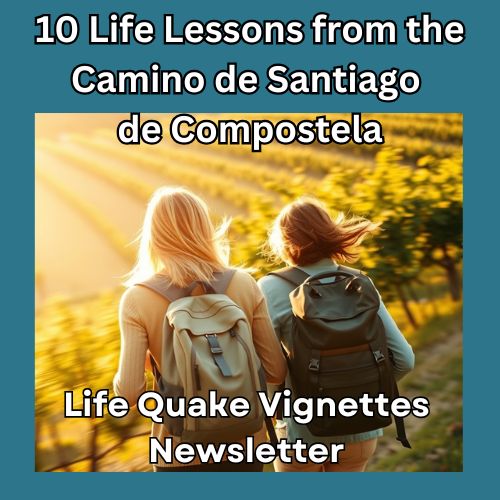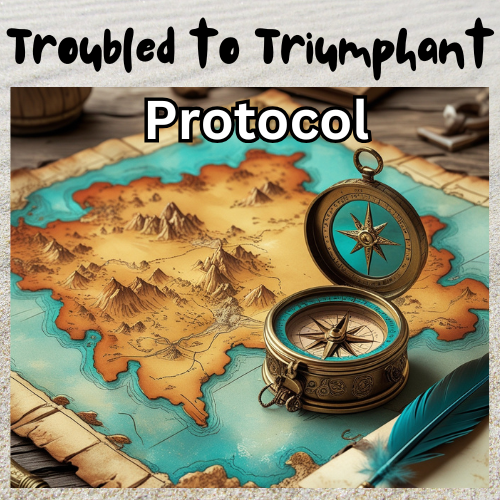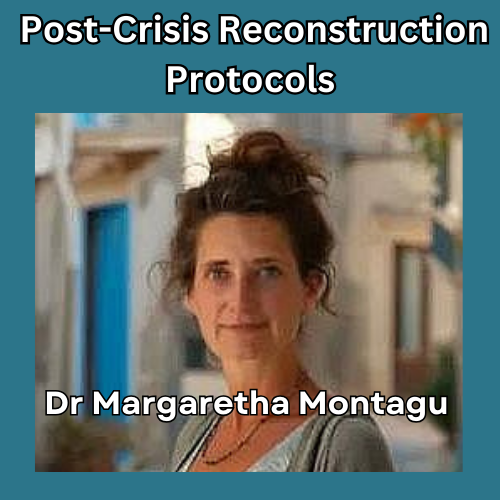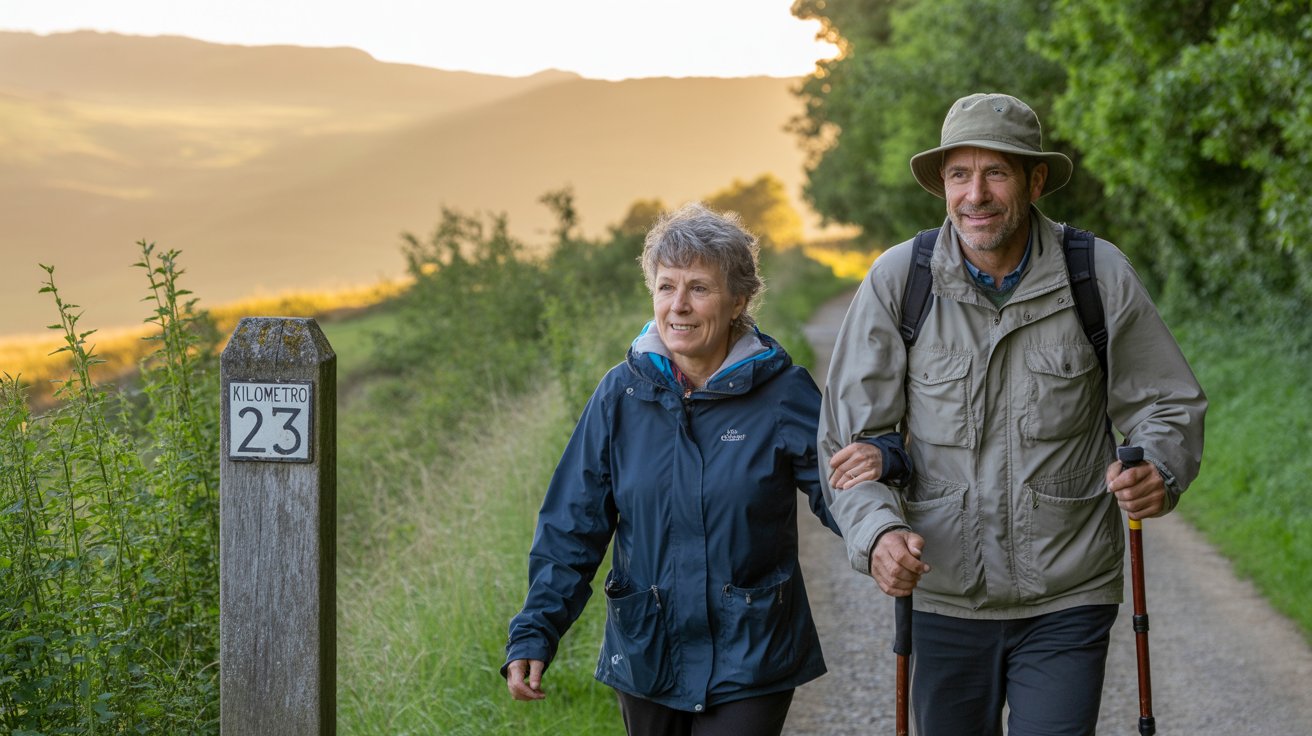Step onto the ancient path, rediscover your rhythm: How a walking retreat in France can rekindle the spark in your relationship.
I have noticed that I’m getting more bookings from couples for my Camino de Santiago walking retreats than I did before. I wondered why – are there now more couples with problems than there were pre-pandemic – or have more couples now discovered the powerful effect that the Camino can have on relationships?
Does the comfortable choreography of YOUR relationship feel more like a clumsy tango than a graceful waltz these days? Have the harmonious notes you once effortlessly struck together devolved into a rather… discordant melody? Fear not, for there’s an ancient path, a sun-drenched ribbon winding through the soul of Europe, that offers not just respite for weary souls, but a profound opportunity to untangle those knots and rediscover each other.
Imagine: the gentle rhythm of your footsteps, the vast expanse of the French landscape and the majestic Pyrenées mountain range stretching from east to west on the horizon, offering inspiration for honest conversations, and the shared triumphs of conquering rolling hills forging bonds stronger than any silken thread. The Camino de Santiago, that legendary trail, isn’t just for the solo walker; it’s a potent crucible for relationships, a place where the complexities of life can dissolve in the warmth of shared experience and quiet reflection.
And it is this very magic, this potent blend of walking and introspection, that inspired me to open the doors of my little farmhouse here in the sun-blessed southwest of France to not just romantic relationships, but relationships of all descriptions: mothers-and-daughters, fathers-and-sons, new friends and old friends. TrailTracers, my 7-day retreats, offer you and your significant other the space and the setting to embark on this transformative journey together, at your own pace, knowing you have a comfortable haven to return to each evening. Think of it: days spent walking through breathtaking landscapes, followed by evenings filled with delicious food, perhaps a glass of local wine, and the comforting silence that allows true understanding to blossom. It’s an invitation to step away from the clamour of daily life and rediscover the simple joy of being truly present in each other’s company. So, if your relationship compass feels a little off course, perhaps it’s time to lace up your boots and let the ancient stones of the Camino guide you back to harmony.
Summary: The Camino de Santiago offers those in difficult relationships a unique opportunity to step away from the demands of daily life and rediscover their connection amidst the simplicity and shared challenges of the pilgrimage. This ancient path provides a powerful backdrop for reflection on relationship patterns and needs. TrailTracers Camino de Santiago walking retreats, in the serene southwest of France, offer a supportive and non-judgmental 7-day experience, allowing couples the space to walk, reflect, and reconnect, returning each evening to a cosy, comfortable 200-year-old farmhouse.
Keep in mind though, the Camino de Santiago cannot mend unmendable relationships.
5 Key Takeaways:
- Shared Steps, Shared Understanding: Navigating the Camino’s physical and logistical challenges together fosters deeper empathy and strengthens teamwork within the relationship.
- The Rhythm of Reflection: The unhurried pace of walking provides a rare and valuable space for open, honest conversations, free from the distractions of everyday life.
- Perspective on the Path: Stepping away from familiar routines and environments allows for a fresh perspective on ingrained relationship dynamics and individual needs.
- Back to Basics, Back to Each Other: The Camino’s simplicity highlights fundamental needs and shared values, stripping away superficialities and focusing on what truly sustains a relationship.
- Individual Growth, United Connection: The time for personal reflection amidst the beauty of the natural world encourages individual growth, which in turn enriches and strengthens your bond.
Introduction
For centuries, pilgrims have trod the ancient paths leading to Santiago de Compostela, each step a prayer, a meditation, a quest. But beyond the individual spiritual journey, this venerable trail holds a unique potential not just for couples, but for all relationships. Imagine walking hand-in-hand, or perhaps a comfortable distance apart, through landscapes that whisper tales of resilience and endurance. The Camino becomes a shared experience, a parallel journey where you can find a new equilibrium. It begs the question: in our relentlessly fast-paced world, where connection often feels mediated by screens and fractured by obligations, can this ancient pilgrimage offer a tangible pathway to understanding and strengthening the intricate tapestry of modern relationships, particularly those bearing the weight of time and complexity?
The Camino as a Mirror of Our Relationships
The beauty of the Camino lies not just in its stunning vistas but in its uncanny ability to reflect the dynamics of our inner and outer worlds. Not just for couples, but for all relationships, this reflection can be particularly profound.
Shared Challenges, United Front: Life throws curveballs, and so too does the Camino. There are steep inclines that test physical endurance, unexpected downpours that soak you to the bone, and the simple logistics of finding the next direction-indicating sign. Navigating these shared challenges, the small triumphs and minor setbacks, can forge an unexpected sense of camaraderie. You might find yourselves instinctively offering a hand up a slippery slope, sharing the last piece of fruit, or simply offering a weary smile of encouragement. In these moments, the roles we sometimes rigidly adhere to in daily life can loosen, revealing a more fundamental partnership, a shared commitment to reaching the destination together, both literally and figuratively.
The Gift of Time and Space: In our daily lives, time often feels like a precious commodity, sliced into ever-smaller portions. Conversations with our partners/family/friends can become rushed, punctuated and fractured by the demands of work, family, and technology. The Camino, however, unfolds at a different rhythm. The gentle cadence of walking, the vastness of the landscapes, and the relative simplicity of each day create a spaciousness that is rare and precious. Imagine pausing by a babbling brook, the only sounds the gentle rush of water and the chirping of birds, and finally having the uninterrupted time to truly listen to each other, to hear not just the words but the unspoken emotions beneath. These unhurried moments can allow for conversations that delve deeper, addressing issues that might otherwise remain buried under the weight of routine.
Stripping Away the Noise: Our modern lives are saturated with distractions – notifications pinging, endless to-do lists, the constant hum of societal expectations. The Camino, in its beautiful simplicity, encourages a shedding of these superficial layers. Carrying only what is essential on your back is a powerful metaphor for focusing on what truly matters in your relationship. The external pressures and material concerns that can often fuel conflict fade into the background, allowing you to focus on the fundamental connection you share. Picture yourselves sharing a simple meal at a rustic table, the conversation flowing freely, unburdened by the usual anxieties of life back home. It’s in these stripped-down moments that the essence of your relationship can shine through.
Individual Journeys, Shared Path: While walking together, the Camino also offers ample opportunity for individual reflection. The rhythm of your steps can become meditative, allowing each person the space to process their own thoughts and feelings. This individual journey is not separate from the shared experience; rather, it enriches it. As you walk, you might become more aware of your own needs and how they intersect with your partner’s. Sharing these reflections in the quiet evenings can lead to a deeper understanding of yourselves and each other, fostering a greater sense of empathy and mutual respect. Imagine walking in comfortable silence for a stretch, each lost in their own thoughts, and then later, sharing a newfound insight that strengthens your bond.
A Spellbinding Story: The Stone and the Song
The wind, a restless spirit, whipped at Elara’s hair as she trudged up the dusty track, the weight of her pack a dull ache mirroring the weight in her chest. Beside her, Liam’s silence was a familiar, heavy cloak. They had once moved through life like a perfectly harmonised duet, their steps in sync, their laughter echoing in shared joy. Now, a discordant note had crept into their melody, a persistent dissonance that neither seemed to know how to resolve.
Liam stopped abruptly, his gaze fixed on a small, smooth stone at his feet. He picked it up, turning it over and over in his calloused hand. Elara watched him, a familiar knot tightening in her stomach. His silences had become vast, unbridgeable canyons.
“It’s… smooth,” he finally said, his voice rough, as if unused. “Been worn down by time and travel.”
Elara merely nodded, her own throat tight with unspoken words. Their journey on the Camino had begun with a fragile hope, a desperate attempt to mend what felt increasingly broken. But the miles, instead of bringing them closer, seemed to have amplified the distance between them.
One evening, huddled in a small bistro as rain lashed against the stone walls, a group of pilgrims began to sing. The melody, ancient and soulful, filled the room, weaving its way into the weary hearts. Liam, usually so reserved, started to hum along softly. Elara watched him, a flicker of the man she had fallen in love with returning to his eyes.
Later, as they lay side-by-side on thin mattresses, the silence felt different. It wasn’t the heavy, accusatory silence of their recent months, but a quieter space, filled with the echo of the song and the shared exhaustion of the day.
The next morning, as they walked through a sun-drenched vineyard, Liam reached out and gently took Elara’s hand. His touch was tentative, yet it sent a tremor through her. They walked in silence for a long while, the only sound their footsteps on the path and the rustling of leaves.
Then, Liam spoke, his voice low. “Remember that little café in Paris? The one where we first said ‘I love you’?”
Elara’s breath hitched. It was a memory she had almost buried under layers of hurt and disappointment. She nodded, tears pricking her eyes.
“I… I miss that,” he confessed, his gaze fixed on the path ahead. “I miss us.”
The words, simple and raw, hung in the air. Elara squeezed his hand, her own emotions a tangled mess of relief and lingering pain. The path ahead was still long, the challenges still present, but in that moment, something shifted. The heavy stone of silence between them had cracked, and a fragile melody, the possibility of their song rekindling, began to play once more. The Camino hadn’t magically solved their problems, but it had created the space, the quietude, for them to finally hear each other again.
Finding Perspective and Renewed Connection
The Camino de Santiago, in its essence, is a journey of stripping back the superfluous and focusing on the fundamental. For couples, this translates into an opportunity to peel away the layers of daily stress, societal expectations, and ingrained patterns that can often obscure the core of their connection. The shared experience of navigating the physical demands, the reliance on each other for support, and the sheer amount of uninterrupted time spent together can create a powerful opportunity for understanding.
Stepping outside of your familiar environment disrupts the routines that can sometimes breed resentment or stagnation. The Camino offers a neutral ground, a place where you are both simply pilgrims, facing the same challenges and sharing the same small victories. This shared vulnerability can break down walls and foster a renewed sense of partnership.
Moreover, the time for individual reflection amidst the beauty of the natural world allows each person to reconnect with their own needs and desires. This self-awareness, when shared openly, can lead to a deeper understanding of how to better support each other within the relationship. The stories whispered by the ancient stones, the camaraderie with fellow pilgrims, and the sheer act of putting one foot in front of the other can all contribute to a renewed sense of perspective and a rekindled connection.
Further Reading
- The Pilgrimage by Paulo Coelho: This is a fictionalised account of Coelho’s own journey along the Camino de Santiago. It’s a story of self-discovery, overcoming challenges, and finding the extraordinary in the ordinary. The narrative beautifully weaves together the physical and spiritual aspects of the pilgrimage, offering a glimpse into the transformative power of the path.
- A Field Guide to Getting Lost by Rebecca Solnit: While not specifically about the Camino, this collection of essays explores the themes of wandering, uncertainty, and the beauty of getting lost – both literally and metaphorically. It delves into how embracing the unknown can lead to profound insights about ourselves and our relationships to the world around us, resonating with the unpredictable nature of any journey, including the relational one.
- Hold Me Tight: Seven Conversations for a Lifetime of Love by Sue Johnson: This book, grounded in Emotionally Focused Therapy (EFT), offers practical guidance on how to strengthen emotional bonds in a relationship. It outlines seven key conversations that can help couples understand their emotional needs and patterns, fostering greater security and intimacy – valuable insights to carry onto the Camino and beyond.
- Wild by Cheryl Strayed: Although focused on the Pacific Crest Trail, this memoir of a woman’s solo hike after personal tragedy powerfully illustrates the resilience of the human spirit and the transformative power of putting one foot in front of the other. It highlights how facing physical and emotional challenges can lead to profound self-discovery and healing, themes that can resonate with the individual journeys within a couple’s Camino experience.
- The Art of Travel by Alain de Botton: This philosophical exploration of travel delves into the psychology behind our journeys and how we can cultivate a more mindful and enriching experience. It encourages readers to appreciate the small details, find beauty in the mundane, and approach new environments with curiosity – perspectives that can enhance a couple’s shared experience on the Camino.
- Love Sense: The Revolutionary New Science of Romantic Relationships by Sue Johnson: Another insightful work by Sue Johnson, this book explains the science behind why we love and how to build secure and lasting relationships. It provides a framework for understanding attachment needs and how to create a loving and responsive bond, offering valuable knowledge for couples seeking to deepen their connection on the Camino and in their daily lives.
Frequently Asked Questions (FAQ)
- We’re not experienced hikers. Is the Camino too physically demanding? The beauty of the Camino is that it caters to various fitness levels. My 7-day retreats focus on manageable sections, and the non-guided nature allows you to walk at your own pace, taking breaks as needed. It’s more about enjoyment than extreme endurance.
- We’re used to independent travel. Will a “retreat” feel too structured? My TrailTracers retreats are non-guided. I provide comfortable accommodation at my little farmhouse in the evenings, delicious meals, and logistical support, but the walking each day is entirely at your own pace and choice. You have the freedom to walk together, separately, or join other pilgrims as you wish.
- How can walking help our relationship specifically? The Camino provides a unique environment for open communication, shared challenges that build teamwork, and ample time for individual reflection that can then be shared. Stepping away from daily life allows for a fresh perspective on relationship patterns and needs.
- What if we have very different walking paces or preferences? That’s perfectly normal! The non-guided aspect allows each of you to walk at your own rhythm. You can agree on meeting points or enjoy periods of solitary reflection and then reconnect later in the day or at the farmhouse. This respects your individual needs while still sharing the overall experience.
- We’re concerned about discussing sensitive relationship issues without a mediator. Is the Camino the right place for this? The Camino offers a unique, less confrontational environment for discussing sensitive topics. The shared experience and the time away from usual stressors can often make difficult conversations feel less charged. The focus shifts from daily conflicts to deeper reflections. While we don’t provide formal mediation, the supportive and reflective atmosphere of the Camino and our retreats can facilitate more open and honest communication between partners.
Discover Deeper Connection with TrailTracers
If the idea of rediscovering the rhythm and harmony in your relationship amidst the breathtaking landscapes of the Camino de Santiago resonates with you, I warmly invite you to consider a TrailTracers retreat. This 7-day non-guided experiences in the heart of the Gascony vineyards offer a unique blend of personal space and shared experience. Imagine spending your days walking ancient paths, surrounded by stunning scenery, with the freedom to reflect and converse at your own pace. And each evening, return to the comfort and tranquillity of my farmhouse, where you can relax, enjoy delicious local cuisine, and simply be present with one another, far from the distractions of everyday life. It’s an opportunity to press pause on the complexity of everyday life, rediscover the simple joy of your connection, and perhaps, like the stone and the song, find a renewed harmony in your shared journey. À bientôt on the trail!

10 Powerful Life Lessons Learned While Walking the Camino de Santiago – a free guide filled with 10 not just “quaint anecdotes” or Instagram-worthy moments (though there are plenty of those) but real transformations from real people who walked the same insight-giving trail you might want to walk one day walk – Subscribe to the LifeQuake Vignettes newsletter to Download the Guide
Hit the pause button and regain your footing during a From Troubled to Triumphant Retreat. Imagine walking a peaceful stretch of the Camino de Santiago, where every step helps untangle the mental clutter or spending time with gentle Friesian horses who teach you the art of mindfulness. Whether you choose to make a change or are forced to, this retreat offers the perfect blend of peace, perspective, and playful exploration to help you rise from troubled to triumphant!


“I am an experienced medical doctor – MBChB, MRCGP, NLP master pract cert, Transformational Life Coach (dip.) Life Story Coach (cert.) Counselling (cert.) Med Hypnotherapy (dip.) and EAGALA (cert.) I may have an impressive number of letters after my name, and more than three decades of professional experience, but what qualifies me to excel at what I do is my intuitive understanding of my clients’ difficulties and my extensive personal experience of managing major life changes using strategies I developed over many years” Dr M Montagu

